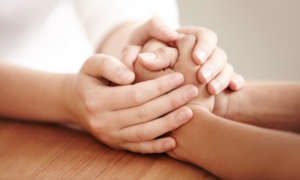 Nobody wants to get the news that a friend or loved one has been diagnosed with cancer. Yet, according to the American Cancer Society, there’s a very high likelihood that you or someone you know will struggle with this disease, and it’s good to be prepared. When cancer does strike, helpers are often torn between helplessness and hypervigilance, both of which can create problems for the ill person. Here are some tips on how to support a loved one through cancer:
Nobody wants to get the news that a friend or loved one has been diagnosed with cancer. Yet, according to the American Cancer Society, there’s a very high likelihood that you or someone you know will struggle with this disease, and it’s good to be prepared. When cancer does strike, helpers are often torn between helplessness and hypervigilance, both of which can create problems for the ill person. Here are some tips on how to support a loved one through cancer:
Power of routine
 Cancer throws a wrench into someone’s normal life. One of the best things you can do is help your friend or loved one feel as normal as possible. “There’s a lot of power in continuing your routine when you’re in the middle of treatment,” says Jenn McRobbie, author of Why is She Acting So Weird? A Guide to Cultivating Closeness When a Friend is in Crisis. “What would you do if this person weren’t getting cancer treatments? When you figure that out, just do it,” she tells Rewire Me.
Cancer throws a wrench into someone’s normal life. One of the best things you can do is help your friend or loved one feel as normal as possible. “There’s a lot of power in continuing your routine when you’re in the middle of treatment,” says Jenn McRobbie, author of Why is She Acting So Weird? A Guide to Cultivating Closeness When a Friend is in Crisis. “What would you do if this person weren’t getting cancer treatments? When you figure that out, just do it,” she tells Rewire Me.
Talk is cheap
Complicated feelings arise when a loved one receives a cancer diagnosis. It often elicits an urge to say something profound or helpful, but experts and survivors suggest not all statements are helpful, especially the dreaded ‘everything happens for a reason.’ “Do not offer medical advice,” advises Susan Chaityn Lebovits, Executive Director of Boston Cancer Support. “Do not suggest or prophesize ways in which the patient may have gotten cancer.”
“Take direction from your friend. Let them talk and you listen,” says Amy Alkon, syndicated columnist of The Advice Goddess. “Most of us are not good at dealing with profound life issues and we don’t know what to say,” she says, after caring for a close friend through terminal cancer.
If you’re tongue-tied for the right words, the most important thing to do is to “Just show the hell up,” says Alkon.
Don’t ask; do
 In our bids to help, a common mistake is to ask the patient what kind of help they need. Experts agree that the last thing a cancer patient needs to do is figure out how you can help them. Instead, just show up and offer to handle the most obvious tasks at hand. Dishes in the sink? Wash them. Garbage piling up? Take it out. Offer to walk languishing pets and drive children to school or entertain them after school.
In our bids to help, a common mistake is to ask the patient what kind of help they need. Experts agree that the last thing a cancer patient needs to do is figure out how you can help them. Instead, just show up and offer to handle the most obvious tasks at hand. Dishes in the sink? Wash them. Garbage piling up? Take it out. Offer to walk languishing pets and drive children to school or entertain them after school.
Shawn Speen, director of a literacy network in Wisconsin, lost her husband to cancer in 2010, and was grateful to friends who helped along the way. “Instead of saying ‘Let me know what I can do to help, just announce your intention. Asking for help and deciding on the manner of that help can be exhausting to the patient.”
If you aren’t sure which task would be most helpful, you can always ask the spouse or another family member what needs doing. You can also incorporate their tasks into your own. If you’re already going to the store, ask what you can buy for them, and so on.
Family support
The immediate caregivers of cancer patients are often overlooked in the process, when they are the ones doing a lot of work. “Caregivers are tired, anxious and frequently overwhelmed,” explains Lebovits. “They may have had to stop working and are worried about finances; are concerned that they may miss giving a medication or are taking over the responsibilities of the patient, as well. Offer to stay with the patient on a particular day, so they can have a break.”
A time for something special
 Though many cancer patients want to feel as normal as possible, there is a time for doing something special. Sheyda Irani, a nurse and radio host in Missouri, recommends creating a “chemo bag of goodies” that the patient can take with them on chemotherapy treatments. The bag can include encouraging words, letters, poems, cards, favorite snacks, etc.
Though many cancer patients want to feel as normal as possible, there is a time for doing something special. Sheyda Irani, a nurse and radio host in Missouri, recommends creating a “chemo bag of goodies” that the patient can take with them on chemotherapy treatments. The bag can include encouraging words, letters, poems, cards, favorite snacks, etc.
“This simple gesture of love and kindness can replace the feeling of dread that most cancer patients endure when faced with the agonizing process of chemotherapy,” says Irani. Also, whenever possible, never let an ill person go alone to a chemotherapy appointment.
Create an online community page
When a person becomes sick, offers of wellness and support from well-intentioned community members can pile up. Use one of several services that organize help for your friend, such as Caring Bridge and similar sites. With these services, you can create one central page for people to post supportive messages, get info, donate money, sign up for meal delivery or appointment driving times.
Ultimately, the best thing you can do for a loved one dealing with cancer is to show up, express your love and support, and be available for needs that may arise.
